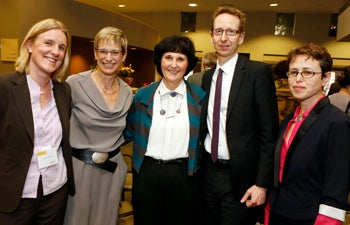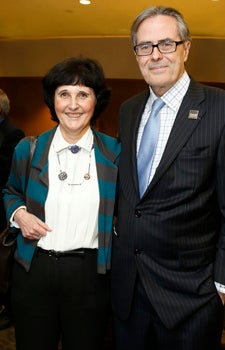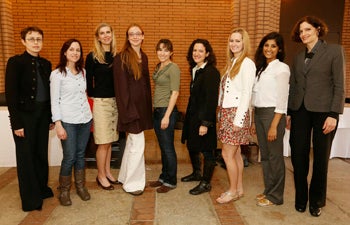Hanna Reisler Celebrated
Speaking at a recent symposium held in her honor, USC Dornsife’s Hanna Reisler recalled the early days of USC’s Women in Science and Engineering (WiSE) program.
At the time, women with tenured or tenure-track faculty positions in the science and engineering departments at the University Park campus of USC numbered 15: a dozen in USC Dornsife, and three in USC Viterbi School of Engineering. (WiSE does not have programs at Keck School of Medicine of USC.) Reisler recalled gathering many of those faculty to discuss a way to spend an anonymous $20 million donation to increase the representations of women in science and engineering at the university.
Founded in 2000, the WiSE program would become the result.
“I am a believer in taking action, and that was how the WiSE program at USC started,” said Reisler, Lloyd Armstrong Jr. Chair for Science and Engineering and professor of chemistry in USC Dornsife.
At the first networking meeting in May 2000, the group established important strategies and guidelines that should be part of the program. One principle was that the recruitment of female faculty should be done as part of regular searches and qualified women must rise to the top alongside men. Also, the program should address subtle biases and career interruptions that may slow the progress of women. That includes a trend in which women opt out of careers in the academe, choosing not to pursue faculty positions because they fear they can’t balance family with academic careers.
During the “WiSE Research Horizons: A Day Honoring Professor Hanna Reisler,” March 27 event held on University Park campus, Reisler delivered the keynote address. Several 2013 WiSE Awards, which include merit awards for Excellence in Postdoctoral Research and undergraduate research grants were given, and a Hanna Reisler Mentorship Award was announced. The new annual award will recognize faculty, students and postdoctoral researchers who show a commitment to mentoring women in STEM fields at USC.

Hanna Reisler, Lloyd Armstrong Jr. Chair in Science and Engineering and professor of chemistry in USC Dornsife (center) stands with USC Provost Elizabeth Garrett to her right and USC Executive Vice Provost Michael Quick to her left. Sarah Feakins, assistant professor of earth sciences in USC Dornsife, far left, and WiSE director Leana Golubchick also stand with the group during a recent dinner at USC celebrating Reisler. Photo by Steve Cohn.
USC Provost Elizabeth Garrett praised Reisler for inspiring the entire academic community as a talented researcher, teacher and mentor.
“Her dedicated involvement with WiSE — as its cofounder and devoted champion — has shaped the organization and improved the scholarly careers for hundreds of women students and faculty across the university,” Garrett said during a dinner held at the Davidson Continuing Education Confererence Center after the symposium.
Since WiSE was launched, the number of USC’s women faculty in tenured and tenure track positions in science and engineering has tripled. In total, 45 women now hold these faculty positions in USC Dornsife and USC Viterbi. A WiSE faculty networking group meets monthly and strives to increase the number, plus mentor and retain those hired.
“At the heart of the culture change is professor Hanna Reisler who believes in focusing on the positive, and on institutional and societal change,” said Leana Golubchik, director of WiSE and professor of computer science in USC Viterbi. “Hanna’s strong sense of fairness and ability to be inclusive and encourage others to join in this important effort has led to a WiSE program that fosters a supportive research environment.”
Golubchick said Reisler has set a high bar for excellence in mentorship.
“Throughout her career, and particularly in the last 13 years since WiSE was founded, Hanna’s dedication to mentorship of faculty and students, men and women, and to the advancement of women scientists at all career stages has been unparalleled.”
Executive Vice Provost Michael Quick, professor of biological sciences in USC Dornsife, lauded Reisler, chair of the WiSE advisory board until 2012, for including postdoctoral fellows, Ph.D. students and undergraduates in the effort.
Oftentimes what blocks women’s progress particularly in science and engineering is difficult to define, he noted.
“There are assumptions dressed up like truths sometimes; they can be subtle,” Quick said. “For instance, the ways that male and female children are encouraged to pursue different interests or the way that some female students are teased for loving math or science or engineering.
“This conference is really about research, innovation; about celebrating everything that these scientists and engineers at USC have accomplished,” Quick said. “So congratulations to all of you on the tremendous science you do every day.”

USC Dornsife’s Hanna Reisler with Charles McKenna, professor of chemistry and vice dean for natural sciences in USC Dornsife, during a dinner at USC honoring Reisler and USC’s Women in Science and Engineering (WiSE). Photo by Steve Cohn.
Charles McKenna, professor of chemistry and vice dean for natural sciences in USC Dornsife, attended the conference and the following dinner. He stressed that Reisler is peerless when it comes to mentoring.
“For this occasion,” he began, “I’ve been trying to come up with a laudatory superlative for her mentorship — exceptional, incredible, phenomenal, fantastic, tremendous, stupendous — one of my graduate students who participates in WiSE told me, ‘Oh, Professor Reisler is just awesome!’
“As a long-time colleague of Hanna’s in the chemistry department, I have had the privilege of watching her in action — especially in advising and helping graduate students, postdocs and junior faculty, including some members of my own research team. ‘Awesome’ definitely sounds right.”
To increase the number of women in tenured and tenure-track faculty positions, the WiSE program administers a variety of grant programs for USC faculty, postdoctoral scholars, Ph.D. and undergraduate students in science and engineering. These programs encourage women to select USC for study, research and to help them develop successful careers.
Grants and awards offered by the WiSE program include faculty recruitment grants, merit awards, travel grants, undergraduate research grants, supplemental research support, child care subsidies and fellowships to accommodate pregnancy, childbirth and adoption for Ph.D. students and postdoctoral scholars. The program also hosts a distinguished lecture series as well as networking events.
Judith Hirsch, chair of the WiSE advisory board and professor of biological sciences in USC Dornsife, emphasized that WiSE’s success extends beyond increasing the number of women faculty at USC.
“Women scientists and engineers at USC successfully competing at the national and international levels have contributed to institutional strength leading to a lasting long-term cultural change,” Hirsch said.
During her speech, Reisler also described her own research, which focuses on understanding the detailed mechanisms of chemical reactions in gas and condensed phases by using laser and molecular beam techniques. Her research group’s mission is to explain reaction mechanisms at the molecular level.
Anna Krylov, professor of chemistry in USC Dornsife, introduced Reisler, describing her as a brilliant scientist working at the interface of chemistry and physics.
“The hallmark of her research is technical finesse, rigorous analysis and insightful interpretation,” Krylov said.
Reisler received her bachelor’s and master’s degrees from the Hebrew University of Jerusalem. She earned her Ph.D. in physical chemistry from the Weizmann Institute of Science in Israel, and was awarded an Atomic Energy Agency Fellowship to pursue postdoctoral studies at the Johns Hopkins University in Baltimore, Md. Subsequently, she became a group leader of the Chemical Laser Project at the Soreq Nuclear Research Center in Yavne, Israel.
Reisler joined what is now called USC Dornsife as a research scientist in 1977, and was appointed associate professor in 1987, then professor in 1991. She has authored more than 170 papers and book chapters. She has won a Max Planck Research Award, and the Broida Prize of the American Physical Society, among many awards and honors, including an American Physical Society Fellowship, and an American Association for the Advancement of Science (AAAS) Fellowship. She has earned the USC Raubenheimer Outstanding Senior Faculty Award, the USC Mellon Mentoring Award and USC Provost’s Excellence in Mentoring Award.
In addition to recognizing Reisler, the symposium featured WiSE faculty presenting some of their current projects.

The 2013 WiSE Award recipients gather together during the WiSE Research Horizons conference, which highlighted Reisler and USC’s Women in Science and Engineering (WiSE) program. Photo by Steve Cohn.
“Above all, the most important thing we try to bring to the university is good research,” Reisler said.
Reisler said she was honored to have a scholarship created in her name: “Mentoring beyond one’s own department has been one of the cornerstones of the WiSE program, and recognizing this by an award is very meaningful to me. Successful mentoring must always be based on trust and respect, and trust is built in a long term one-on-one relationship.
“What I realized early on was that such long-term relationship benefits both parties. I hope that I was able to give useful advice, even though it was not always pleasant to hear, and I certainly learned a lot from the point of view of my younger colleagues and their experiences. I myself benefited greatly from good mentorship when I started my faculty position, and I try to pass on what I have learned.”
During the symposium, students approached Reisler, asking her advice and questions about her career path.
Lee Ch’ng, a Ph.D. student working in Reisler’s laboratory, said that WiSE has provided an exceptional level of support throughout her research at USC. “I get to interact with senior faculty and postdocs, and ask them many questions. We learn from each other.”
Learn more about the WiSE program at usc.edu/programs/wise.